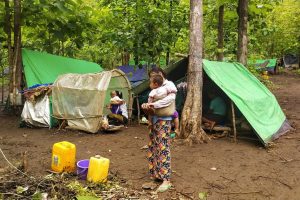For decades, the Myanmar military has waged a violent campaign of terror against civilians. Coordinated attempts have sought to drive ethnic groups from their homelands through systematic and widespread violence that has not spared even the most vulnerable. These same militarized acts continue today, contributing to a worsening sense of insecurity.
Our organizations – the Karenni Human Rights Group, the Kayan Women’s Organization, the Karenni National Women’s Organization, and the Kayah State Peace Monitoring Network – recently released a new report, “How can we survive in the future?”: Atrocity Crimes in Karenni State. In the report, we document extensive evidence of war crimes and crimes against humanity committed by the regime in the Karenni areas between May 2021 and September 2022. The junta’s systemic cycle of violence continues unabated. As recently as January 24, 2023, the military used warplanes to target Karenni civilians seeking refuge in internally displaced persons (IDP) camps in Loikaw, the capital of Karenni State.
Karenni (Kayah) State is a small state situated in eastern Myanmar, with an approximate population of 300,000. Another estimated 120,000 Karenni people live in the Pekhon township area to the northwest of the geographic boundary of Karenni State, in southern Shan State. Since May 2021, more than 40 percent of the Karenni population has been forcibly displaced, mostly women and children. The five townships of Loikaw, Hpruso, Shadaw, Deemaw Soe, and Pekhon have been almost entirely abandoned. Whenever our people see Myanmar army soldiers or airplanes approaching, they flee because they know that attacks are imminent. IDPs we interviewed for the report repeatedly shared the trauma they are experiencing from the relentless mortar shelling, bombs, and gunfire.
Dozens have been killed in these attacks, and thousands more have lost their homes and livelihoods. Among the key findings in our report, at least 1,190 homes in 87 Karenni towns, wards, and villages have been heavily damaged or completely destroyed by junta forces, in addition to 33 religious buildings and four medical clinics.
Neither age nor gender matters to the Burmese military. As long as they have bodies shielding their battalions from attacks, they continue to force our people to be human shields for them in conflict zones. We documented six separate incidents of forced labor and the use of civilians as human shields by the Myanmar military, involving at least 65 Karenni civilians, including women and children. Four people were killed while serving as human shields.
The Myanmar military consistently fails to adhere to basic human rights norms and principles, terrorizing the Karenni population with no rule of law to hold them accountable. Civilians can be killed anytime, and anywhere by the military. They routinely arrest and punish human rights defenders and activists for resisting the will of the junta. We documented the arbitrary arrests of at least 260 Karenni civilians, including 33 women, by junta forces throughout Karenni areas.
At least 115 civilians have been killed while in regime custody over the reporting period. The arbitrary arrests and murders of Karenni civilians are neither isolated cases nor accidents. These human rights violations are part of a pattern of collective punishment to instill fear into the population.
For too long, our Karenni communities have suffered from targeted violence by junta forces. When we have called for peace, they have turned their weapons on us. Global actors must take concrete steps beyond mere “statement diplomacy” to protect the thousands of civilians who live with the daily threat of being murdered by the military regime.
We welcome the recent decisions by the United States, United Kingdom, Canada, Australia, and New Zealand to impose new targeted sanctions on the second anniversary of the attempted coup. The U.K. imposed sanctions on individuals and parts of the Asia Sun group involved in the transfer of aviation fuel to the junta’s air force, while Canada prohibited the export, sale, and supply of aviation fuel to the regime. The new U.S. sanctions focus on the Union Election Commission, military-controlled mining entities, and officials in the energy sector.
But in the wake of two years of atrocity crimes, so much more urgently needs to be done to cut sources of arms, aviation fuel, and revenue to Myanmar’s military regime. It requires a concerted, coordinated global effort. The response from the international community has been painfully slow and inadequate. As a result, the junta is emboldened to commit more atrocity crimes with impunity.
Domestically, our legal system cannot hold Myanmar soldiers accountable for their actions, as impunity is embedded in the system. We urge the international community to acknowledge that the junta is responsible for war crimes and crimes against humanity – not only in Karenni State, but across the whole country – and act accordingly. There must be international justice and accountability to end the cycle of impunity. The situation in Myanmar demands a referral to the International Criminal Court, which provides a pathway to justice and reparations for the thousands of victims. We also urge states to exercise universal jurisdiction to investigate any individual from Myanmar who may be responsible for committing war crimes, crimes against humanity and genocide.
Without justice and accountability, there can be no lasting peace. Our Karenni communities simply want to live in peace and enjoy basic human rights.













